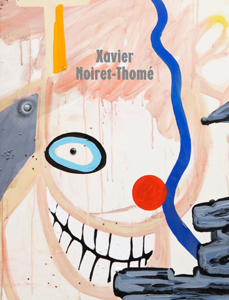First monograph dedicated to Xavier Noiret-Thomé's pictural telescopings, between figuration and abstraction, between iconophilia and iconoclasm, between references to art history and borrowings from contemporary popular culture (with two essays and an interview).
Since 1994, Xavier Noiret-Thomé (born 1971 in Charleville-Mézières, France, lives and works in Charleville-Mézières and Brussels) has been building up a
corpus of paintings of remarkable diversity, that draws on both experience and acquired knowledge. “You always paint what
you are,” says Xavier Noiret-Thomé, illustrating his point
with a reference to Pollock and Cézanne. “I take everything:
history, memory, cinematographic forms as well as
specifically visual ones, and in a space-time that is not linear
but elastic.” Xavier Noiret-Thomé's conception of painting is anything but puritanical
or absolutist. He welcomes it both in its “grandeur” (its
history, its tutelary figures) and for its “weakness” (its
impurity, and even its triviality). The art of Xavier Noiret-
Thomé is at once figurative and abstract,
iconophile and iconoclastic, high and low, contemporary
and untimely. It combines all kinds of media, from acrylic,
lacquer and spray to chrome, ink and the addition of objects
such as coins, mirrors and nuts and bolts, sometimes veering
off into the creation of protean sculpture-objects. Xavier
Noiret-Thomé sees the development of his painting in terms
of telescoping and collapsing forms. Perception of the work
can never be linear. Rather, the beholder is confronted with
a complex, unstable development that ventures outside
categories, determinisms and comfort zones.













